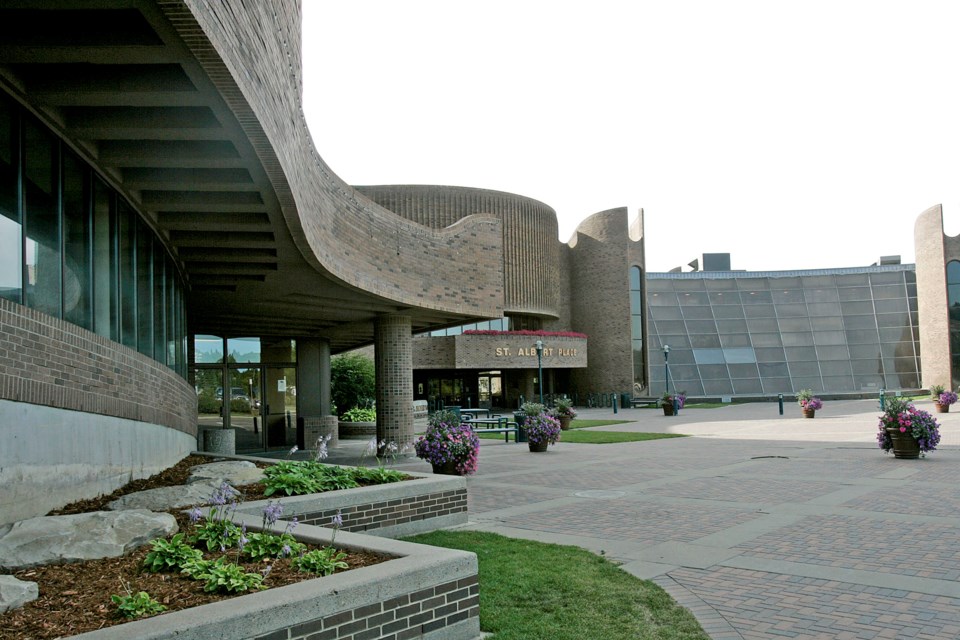A typical homeowner in St. Albert with a single-family home worth $450,000 could see their property taxes go up by 2.5 per cent this year, according to the city’s draft budget.
Presented at council Tuesday afternoon, the proposed increase would amount to an additional $93 in property taxes for the average single-family home. The city also proposed a utility-rate increase of 4.5 per cent, amounting to $5.97 for the typical monthly household utility bill.
St. Albert’s chief administrative officer Kevin Scoble told councillors the city took a “critical look at spending” and identified cost-saving opportunities, including costs associated with delivery of services, to reduce the tax increase from 7.5 per cent to the proposed 2.5 per cent.
“I am very proud of the continued work by administration to find cost efficiencies, reducing the initial tax requirement … which is more palatable in these difficult times,” Scoble said.
He said the city implemented three key strategies to reduce the tax increase: a $3-million reduction through corporate adjustments; a $1.3-million reduction though service-level adjustments; and a $1.2-million reduction by applying all new growth assessments for new initiatives to the tax base.
Scoble said these measures were necessary to lower the proposed tax increase.
“However, those needs remain in order to sustain delivery of services longer term and to implement opportunities identified in the operational and fiscal review,” Scoble said.
The corporate adjustments were mostly one time in nature, Scoble said, and included using $2.5 million from the city’s one-time COVID-19 relief funding. The city also reduced the assessment growth transfer, the public art reserve transfer, and the corporate learning budget.
Scoble said the risk of this action is an impact on the city’s competitiveness in the region.
Scoble also outlined $1.3 million in proposed service reductions. These reductions included removing casual staffing at outdoor rinks; reducing recreation facilities' operating hours; reducing public portable toilets at outdoor recreation facilities and parks; and cancelling Dig in Dining Week, St. Albert’s 10-day dining showcase for local restaurants.
While administration identified seven business cases that were originally prioritized to go forward for council consideration, along with two other business cases identified by council and an external partner, Scoble said given the city’s financial situation, administration’s recommendation is to forgo funding these items.
These business cases included city staff positions, such as a full-time equivalent employee to address ongoing needs of the city’s Indigenous program addressing cultural, economic, development, and other initiatives. They also included some cost-saving measures identified by the city's operational and fiscal review, such as automization and modernization activities.
“Although we realize there is a need for all this work, to keep proposed tax impacts low we did not include these business cases in the proposed budget,” Scoble said. “By deferring business cases we are only postponing addressing the needs in the community and building a stronger organization foundation that can be sustainable long term.”
Through the budget deliberation process, council can consider these business cases, but they will have a tax-related impact, Scoble said.
Difficult year: Scoble
External factors such as a slower-than-anticipated COVID-19 revenue recovery, reduction in capital grant funding, and inflationary costs, made forming the budget this year particularly difficult, Scoble said.
Alberta’s provincial 2021-24 budget alluded to a 25-per-cent reduction in municipal grant funding for local infrastructure projects over the next three years.
Scoble said while the province is intending to replace this grant program — called the Municipal Sustainability Initiative — in 2024 and 2025, this replacement has not been proclaimed in legislation, leaving the city “vulnerable to further reductions.”
He also cited the “extraordinarily” high cost of inflation, which currently sits at four per cent.
“Unfortunately, the looming financial wall we have been discussing in recent years has arrived,” he said. “Now that it’s here there’s an even higher wall to climb than was forecast in past years.”
The city will be using its online tool — called “cultivate the conversation” — to provide opportunities for community input on the budget from Nov. 2 to Nov. 23, 2021. Residents can go to convrsation.stalbert.ca to provide feedback.




